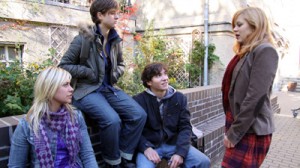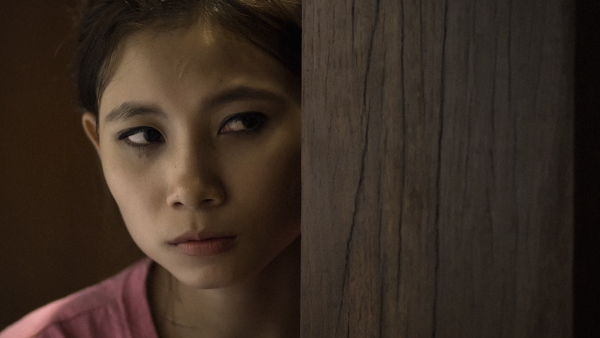 This Thursday the 31st will be the opening night of the 2011 Dallas International Film Festival. One of the features playing the this year’s DIFF is the hard-hitting and emotional German film “She Deserved It“.
This Thursday the 31st will be the opening night of the 2011 Dallas International Film Festival. One of the features playing the this year’s DIFF is the hard-hitting and emotional German film “She Deserved It“.
Based on real-life events, this timely narrative illustrates the darkest side of bullying. Linda is a teenage girl whose own insecurities and frustrations lead her to viciously act out against others. By inviting Linda‘s boyfriend to her birthday party, Susanne unknowingly sets off a chain of horrific events. Is Linda a product of environment and circumstance or was she simply (in her own mother’s words) “born evil”? Perfectly realized performances combined with stellar art direction make SHE DESERVED IT an unforgettable experience. Writer-director Thomas Stiller helms an unflinchingly honest piece that explores the complexities of human nature. The non-sequential timeline means we know the outcome from the beginning, yet we are still shocked and saddened. While a tense and disturbing examination of senseless violence, SHE DESERVED IT also manages to demonstrate the redemptive power of forgiveness.
Prior to its screening, Go,See,Talk got a chance to sit down with German writer/director Thomas Stiller and discuss his film. The following are the highlights from our time with him…
———————————————————————————————————————————————-
– The term “based on true events” can be a funny or even misleading tagline. Just how true were the events depicted and moreover, what about this story made you want to it?
Please don’t put too much attention on “based on a true story” because we don’t wont to get problems with personal rights. The deed happened like you see it in the film – even worse. All the personal stuff between the characters is a work of fiction. I saw a documentary on the real case once and the actual girl was 14 when she killed that other girl.
What really made me angry was how people didn’t want to deal with the young murderer. They called her a monster and she got the hardest sentence a youngster ever got in Germany. Nobody was interested in looking behind the scene, trying to find out what really happened. I don’t say that there is an explanation but at least we can try to understand why things like that happen. Like the mother of the victim does in the film – she needs to confront herself with the person who killed her daughter in order to continue with her own life, to move on.
People have the tendency to not deal with violence as part of our society. But it is. And it is not beautiful, it’s disturbing but it is part of our human nature. The reason why I made the film is – I wanted the people to take a close look and maybe come up with their own question – not just to look away and pretend nothing happened just because you put the killer behind bars. And this is not a single case of violence amongst young people. This happens all over the world. But I’m not the one who deliveres a solution or an explanation – because there probably is none. But maybe we can avoid stuff like that by taking more care about each other.
– One unique and interesting element in “She Deserved It” is how the story is told across multiple timelines. What motivated you to do it in this manner? Also I bet your editor had his work cut out for him huh?
The script was exactly written as the film is edited now. The film wouldn’t work in a chronological order – it would be boring and I would have chosen different scenes. So my editor did just put the scenes together the way I wrote it. Not a singe scene was changed. The reason why I chose this kind of dramatic structure came in the process itself. I didn’t want to offer any simple solutions. I didn’t want to offer the audience a causality.
Because this and this happens you’ll have a killing in the end – it equals murder. I tried to make you feel for each and every character. They are all stuck in their lifes and patterns. It’s not about being a good family or a bad family. The victims family is warm and tender which each other but at the same time they are not able to prepare their daughter for the danger that also exists in the outside world. The killer is not just a killer but a person with unfullfilled needs and desires and she destroys what she despeartely would like to have for herself.
So is her mothet who is completly overcharged with her down-syndrome son, with the secret knowledge that her husband is abusing his dauther. I’m not a moralist – I’m not interested in judging people or making statements in my movies. I want to understand the human process of the human nature and that’s why I rather ask questions then proposing simple answers. What makes us do the things we do ? And what is the real desire behind it.
There are no simple answers. Life is complex and that’s so interesting about it. I want people start to think after the film – it’s an invitation to ask yourself questions.
– The is a very delicate emotional state hiding behind Linda’s fierce and dangerous demeanor/facade. Yet the flashbacks to her journal and her dealings with Oskar show the more human side to her. How did you pull such an unrelentingly toxic performance from Liv Lisa Fries?
Liv Lisa Fries is (for me) the best young actress we have right now. It wasn’t an easy character to play and she was 19 when we shot the movie. She never went to acting school – just finished her high-school. She trusted me – I was very strict with her – when she came up with her own ideas I mostly said no – and after a while she understood where I wanted her to go. But you can only do something like that when you got a talent like Liv. I also didn’t gave her much affection on the set – which she mention later on to me. And it’s interesting – unconciously I put her in the same position Linda is in – meaning: getting no love or attention. But I didn’t want Liv to feel to comfortable on the set – and it paid out. We are really good friends though now.
– The role of ‘Nora Wagner’ was a captivating performance. Her subdued emotions seemed to jump right off the screen as she struggled to keep her composure despite living with the atrocity of her daughter’s death. Did Veronica Ferres bring anything to the role that wasn’t on paper?
No – But she really dared a lot in that film. She was also co-producing it and it was her name that made the financing possible. She is a very well known actress in Germany and usually she plays the heroine – so that was a real different part for her – an interesting challenge and she stood up to it. The interesting thing about her part is that violence, the non-communication slowly creeps into her own life and that is why she can’t go on like this anymore. She needs to face what she fears most – the person that killed her precious daughter. But she knows that she would die inside if she doesn’t do it.
– One element noticeably missing from She Deserved It (that is over saturated and abundant in American films) is a prominent musical theme or score. To me it’s minimal presence allowed the performances to evoke a legitimate emotion rather than have music tell us what and how to feel. Was that an important decision to downplay the score?
It was clear from the beginning that there wouldn’t be a score. For one thing – you can’t combine two scenes with music because the audience would get confused about the time-line they are in. So – structure-wise that wasn’t possible. But I always believed the less music there is – the more space there is for the actors and the story to reach out to the audience. And what would I compose – Lindas theme? No – impossible – I want the audience to like her, or let’s say understand her, to understand her frustration and anger – but you can’t do it via music. It would be completly misleading – she is the main character but she ain’t a hero. But also not the villain. So I chose source music – like making love while listening to Linkin Park – it tells you something about the chracters.
– It seems that the film paints no one as the true scapegoat for Linda’s aggression but everyone as victims of it. On that note is there a message you want to try and establish with She Deserved It?
I sort of answered that before. I want the audience to understand every character – there is no good nor evil. There are always only human beings with all their flaws, hopes and of course destructive energy if they can’t get what they really want – love. All you need is love – that is what everybodies true desire is.
Nora guides us through the film by trying to understand the impossible – by confronting herself with what happened. When she does that – everybody is affected by it – it’s like a karthasis for all the charcters. Everybody is moving on, is drawing consequences – even the “mouse” who hangs him self.
– What element of the film do you feel most proud of?
The acting – it’s the finest acting you can find in Germany – the kids where awesome. I always asked myself – Jesus, where does that come from? They were so real and in the moment – a wonderful experience for a director. And I think it’s a film that get’s to the audience – and this is why I make movies. It took me 5 years to get money together – everybody that – great script – but nobody dared to get in the boat.
———————————————————————————————————————————————-
The 2011 Dallas International Film Festival runs from March 31st to April 11th, 2011. G-S-T would like to thank the Dallas Film Society and Thomas Stiller for their help and time in setting up this interview. I highly recommend you check out this film.
If you want to read the story I wrote on “She Deserved It” to help promote the Festival, you can find it here: Pegasus News



